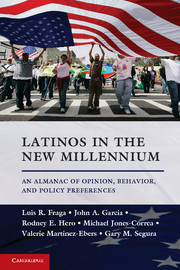Book contents
- Frontmatter
- Contents
- Acknowledgments
- 1 Latinos in the New Millennium
- 2 A Demographic Profile of Latinos in the United States
- 3 Core Values
- 4 Latino Identities
- 5 Latino Transnationalism
- 6 Intergroup Relations
- 7 Civic Engagement
- 8 Latino Media and Technology Usage
- 9 Voter Registration, Turnout, and Choice
- 10 Evolving Patterns and Preferences in Latino Partisanship
- 11 Latinos and Gender Role Attitudes
- 12 Latino Issues and Policy Preferences
- 13 Hope and Reality in Latino Educational Attainment
- 14 Latinos and the Future of American Politics
- Index
- References
7 - Civic Engagement
Entering the Political Process
Published online by Cambridge University Press: 05 June 2012
- Frontmatter
- Contents
- Acknowledgments
- 1 Latinos in the New Millennium
- 2 A Demographic Profile of Latinos in the United States
- 3 Core Values
- 4 Latino Identities
- 5 Latino Transnationalism
- 6 Intergroup Relations
- 7 Civic Engagement
- 8 Latino Media and Technology Usage
- 9 Voter Registration, Turnout, and Choice
- 10 Evolving Patterns and Preferences in Latino Partisanship
- 11 Latinos and Gender Role Attitudes
- 12 Latino Issues and Policy Preferences
- 13 Hope and Reality in Latino Educational Attainment
- 14 Latinos and the Future of American Politics
- Index
- References
Summary
Over the past decade political scientists and sociologists have come to see the importance of people coming together for social or civic reasons. Whether through bridge clubs, food pantries, or political organizations, Americans benefit both individually and as a society when people leave their homes and become involved with others. This coming together, or civic engagement, also helps people develop civic skills that can carry over into other social arenas, including the electoral and political realms, such as voting, political party affiliation, interest groups, social movements, contacting, and others. Greater civic involvement has also been found to heighten interpersonal trust and sense of efficacy, and to give people the sense that they can have an impact on social issues affecting them as well as more generally to improve their attitudes toward the social and political realms, including government.
The term civic engagement has two key ideas associated with it: civic association and social capital. Social capital refers to “connections among individuals in social networks,” and such social contacts, or “connectedness,” affect the well-being and “productivity of individuals and groups” (Putnam 2000, 19). Although the phenomena of social capital and civic engagement are associated in that they seem to go together with trust, reciprocity, and the like, the direction of causation (i.e., which leads to which) is not clear (see, e.g., Hero 2007). Some of the ways social capital contributes to democratic processes include the following:
“Associations and less formal networks of civic engagement instill in their members habits of cooperation and public-spiritedness, as well as the practical skills necessary to partake in public life” (Putnam 2000, 338; see also Verba, Schlozman, and Brady 1995).
“Political information flows through social networks, and in these networks public life is discussed” (Knack 2002, 774).
“Externally, voluntary associations…allow individuals to express their interests and demands on government and to protect themselves from abuses of power from political leaders.” That is, extensive and nurturing social connections through civic association facilitate norms of reciprocity and social trust that deeply enrich a group and the larger society, thus leading to a host of salutary effects (Putnam 2000, 19).
- Type
- Chapter
- Information
- Latinos in the New MillenniumAn Almanac of Opinion, Behavior, and Policy Preferences, pp. 188 - 230Publisher: Cambridge University PressPrint publication year: 2011



